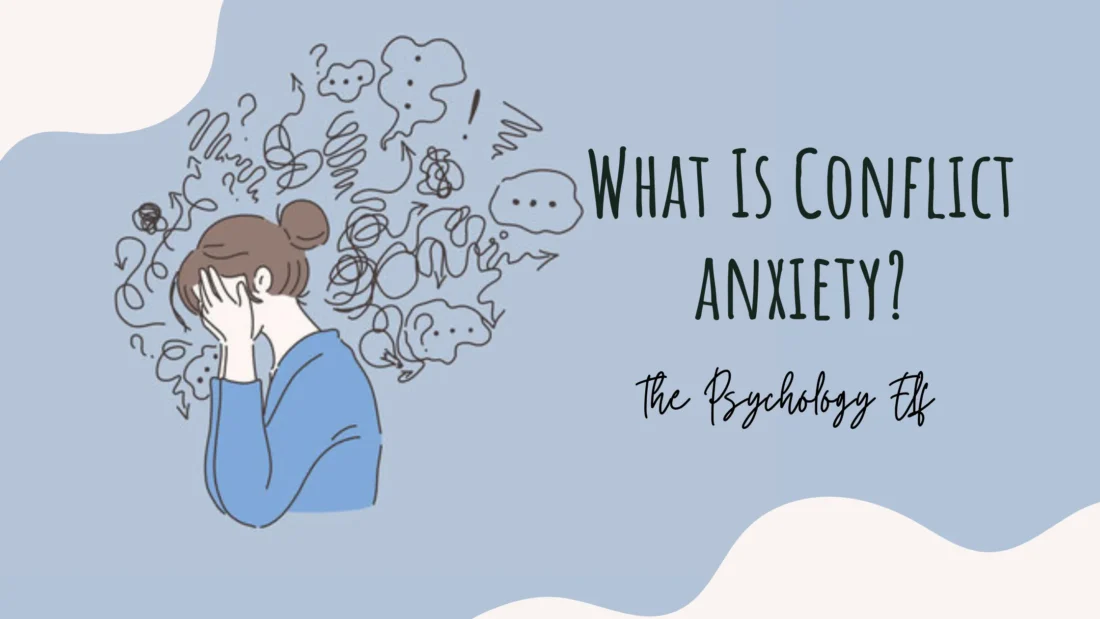To be honest, I had already decided what topic I was going to write on next. However, when a friend asked me what is conflict anxiety, I knew I had to take up this topic. Want to know why? It totally resonates with me. I’ve quite some amount of trouble standing up for myself and having difficult conversations as well. But, my friend bringing up this topic made me feel less alone.
I’m working on it, though. And, once you fully understand what is conflict anxiety, its causes, and how to deal with it, you’ll be able to do so too. So, keep reading!
What Is Conflict Anxiety?
Imagine this: a friend of yours and you are at a shop looking at gift items. And, they accidentally break something. But, when the shopkeeper came running to the spot to look into the matter, your friend pushed the entire blame on you. And… you accepted it. You said nothing, silently withdrew, and let alone that, you bore the consequences.
This is what conflict anxiety can look like. It’s being afraid of conflicts, avoiding them, and dodging potential disagreements no matter what. The example mentioned above is not the only one out there. You get to see it in relationships, the workplace, and even family!
But, let me put it more simply, conflict anxiety can get in the way and not let us be assertive. It can stop us from saying the things that we wish to say – we fear the other person isn’t going to like it. We don’t like getting into arguments or confronting someone over something they did. We don’t like saying “no”, fearing that there will be an argument or that we won’t be able to handle the other person’s reaction.
Someone with conflict anxiety will usually “go with the flow”. They don’t say “no” or stand up for themselves. And, that’s why people often call them “too sweet”, “too kind” or “a sport”. Like, in this situation, the friend who shifted the blame onto your shoulders did it because they knew they can easily get away with it, and you being a sweet person will obviously help to do so.
You’d not say while receiving these compliments may feel nice to you at times, you might surely have realized by this point that what is beneficial to them is actually super harmful to you.
What Are The Causes Of Conflict Anxiety?
Knowing & understanding the reasons will help you empathize with the person who has it, including yourself, and be kind. It will also help you in getting to the root of the problem and b able to find a fix for it.
So, here are some of the causes of conflict anxiety:
Childhood Experiences
If you had a parent who wouldn’t let you voice your thoughts. Or, you only had to listen to them or there would be an argument (which they’d win of course), you grow up learning WHY not to speak your mind, or maybe the consequences of voicing your opinions or disagreeing taught you so.
As a child, having or expecting negative outcomes when standing up to your parents, makes you feel scared of voicing your thoughts. You don’t trust that the other person would handle it well. And, never being able to stand up for yourself in childhood, you never learn how to stand up to authority figures or anybody for that matter.
So, you choose to be a “nice & sweet” person. It’s easier to avoid/ dodge/ deflect/ change the subject/ stonewall/ silently resent, instead of confronting and having hard conversations, right?
Honestly, I can list a hundred ways why childhood experiences are SO important and how much harm negative ones can cause.
People Pleasing Tendencies
I mean, if you’re always nice and keep the other person happy by not getting into disagreements with them, then everything would be calm, right?
So, conflict anxiety can arise from people-pleasing tendencies, that arise from our fear of upsetting others (this again has a root in childhood). You fear that the other person won’t like you, and you obviously want to be liked.
Why Is Conflict Anxiety SO Harmful?
You can go about your day being nice, kind, and sweet. Why go out of your way to understand the whole of this and then put some work into making it better?
Well, I know that’s an easier option. But, easy doesn’t necessarily mean right. And, when you understand a few of the negative effects of conflict anxiety, it may convince you to change a thing or two. So, here it goes:
- By avoiding disagreements or conflicts, you’re bottling up your emotions and generating more and more frustration.
- Not being able to talk about how you feel or what you think makes you feel lonely.
- Believe it or not, avoiding conflicts actually harms relationships. Because all kinds of relationships demand honest communication, hard conversations, and a safe space to be able to open up and talk about yourself. Not getting all this harms intimacy and leads one to harbor resentment.
- By not being able to say ‘no’, you end up feeling uncomfortable on the inside– all the time.
- When you can never say no to anyone at all, but then come across people who are well-versed in The Art Of Saying No, and don’t return the favor, or even uphold boundaries, you feel worse. You might even end up thinking that your relationship is incomplete.
How To Deal With Conflict Anxiety?
In this section, I’m including some of the things that helped me deal with my conflict avoidance. And here’s what helped me:
Practice Saying ‘No’ In Low-risk Situations/ Small Situations
Here, what I mean by small or low-risk situations is, to say ‘no’ to a friend, a colleague (that’s on the same level of hierarchy as you, preferably), or wherever you feel it is “safe” to say no. I mean, somewhere you won’t have to face any consequences of saying no. Like, what can a friend do if you decline a request or turn down an offer that doesn’t make you feel good?
From here, you’ll get practice in saying no. When you see that there are no negative consequences that you think would follow because of using ‘no’, you gather evidence that it’s okay to use the N-word.
Exposure therapy, a part of CBT, works on the same concept. (I do not mean this piece of advice will act as a replacement for the actual thing).
Have A Plan
Plan your arguments in your head. Plan what you’re going to say when you’re going to say it, where you’re going to say it, and in what way. It will make you feel a bit more prepared and therefore a bit more confident.
Be clear about what you wish or plan to achieve with the confrontation.
Try Speaking Your Mind
On a similar note, try speaking your mind. Like, complain about something you don’t like. Mess shit up on purpose (in a low-risk situation). Stand up to a bully, or someone who usually likes to push you down. Try not to be “too nice or sweet” with them.
Now, a pro tip: when you initially start doing it, you may not sound as confident as other people do. You may get a bit aggressive, your tone may increase, you might get super defensive, and it may not come out as you planned it in your head. But, let it be; do it anyways. Remember, practice makes a person perfect.
Try To Relieve Stress Of The Moment
If your heartbeat tends to increase when you’re arguing with someone or speaking your mind, take deep breaths, touch something, or smell something that makes you feel comforted. The point here is to use your senses to ground yourself. Doing these things will help you stay calm and grounded.
Conclusion
I conclude that writing this, in fact, talking to my friend about this, felt nothing short of a personal attack. Because there was a time when I couldn’t stand up for myself or say ‘no’ to a friend for a favor they asked, or even to a shopkeeper who was persuading me to buy something I didn’t even like! But, I’ve come a long way from there. And, if you are someone who tends to avoid conflicts at all costs, I hope you do too.
Sources
Conflict Avoidance Doesn’t Do You Any Favors
Overcome the Fear of Conflict With Therapy
Overcoming the Fear of Confrontation


Very well written Cherry!
Thank you, Om!
I do not have conflict anxiety, but now I know how to feel for some of my friends who have this.
Thank you!
I’m glad this article could add help you understand the plight of someone with conflict anxiety!
Thank you for your articles. They are very helpful to me. May I ask you a question?
Thank you for your articles. They are very helpful to me. May I ask you a question?
Your storytelling abilities are nothing short of incredible. Reading this article felt like embarking on an adventure of its own. The vivid descriptions and engaging narrative transported me, and I can’t wait to see where your next story takes us. Thank you for sharing your experiences in such a captivating way.
Insightful piece